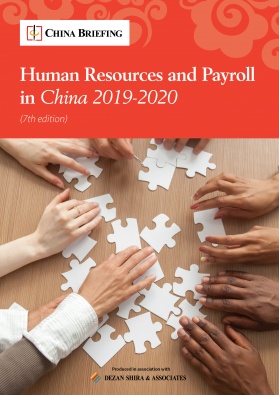How Foreigners Can Claim Social Insurance Payments When Leaving China
Foreigners can participate in China’s social insurance scheme. China Briefing explains how foreigners can claim their social insurance payments when they leave the country.
Foreigners (including residents from Taiwan, Macau, and Hong Kong) working in China have been required to participate in the country’s social security system starting from 2011, according to the Interim Measures for Social Insurance System Coverage of Foreigners Working within the Territory of China (Interim Measures), released by the Ministry of Human Resources and Social Security (MOHRSS).
In general, the employer and the employee should pay five social insurance premiums:
- Basic old-age insurance for employees (pension);
- Basic medical insurance for employees;
- Work-related injury insurance;
- Unemployment insurance; and
- Maternity insurance.
Among these, the premiums for old-age, medical, and unemployment insurance are jointly contributed to by the employer and employee, whereas the premiums for work-related injury and maternity insurance are solely contributed to by the employer.
In practice, however, inconsistencies exist in the way social security is managed at the regional level in China.
While most regions have made it mandatory for foreigners to contribute to five types of social insurances (Beijing, Tianjin, Shenzhen, Nanjing, Guangzhou, and Jiangsu etc.), some regions do not require it. For example, foreigners in Shanghai can opt out of paying social insurance and foreigners in Dalian only need to contribute towards pension and medical insurance.
Further, China also offers social insurance exemption for foreigners from some countries, which have signed bilateral social insurance exemption agreements, such as Germany, South Korea, Denmark, Canada, Finland, Switzerland, and the Netherlands.
When living in China, foreigners covered in the social insurance system are entitled to benefits of basic medical insurance, work-related injury insurance, and maternity insurance, according to the regional implementation policy. There are usually no unemployment benefits for foreign employees as a foreigner without permanent residency and not employed in China will not be permitted to continue living in China.
As for pension, same as Chinese residents, foreign employees who have contributed to the pension fund for 15 years or longer and have reached the legal retirement age in China (60 years for men and 55 years for women) can start receiving a monthly retirement income, even when living outside of China. The only difference is that if they live outside of China, they must annually submit a document of living proof issued by a Chinese embassy or consulate to the social insurance agency that pays the benefits.
What happens to social insurance accounts when leaving China?
According to the Interim Measures, for foreigners who leave China before reaching the legal retirement age in the country, the social insurance individual account will be retained, and will be renewed on a cumulative basis when the person returns to work in China.
Alternately, foreigners can apply to terminate their social insurance individual account upon written application before leaving China. The amount remaining in the individual account can be paid lump sum to the person.
Foreigners must check out the specific implementation regulations and application processes at their local Human Resources and Social Security Bureau.
In Shanghai, for example, foreigners who participate in the social insurance system can also withdraw savings from their individual pension accounts in one lump sum when they reach the statutory pension age and are no longer in an employment relationship, regardless of leaving China or not.
To be noted, although the premiums for pension are contributed to by both the employer and the employee, only the employee’s contribution, which is saved in the individual pension account, can be withdrawn.
As employees in China pay eight percent of their wages every month on a mandatory basis, the foreigner can withdraw the accumulative eight percent of their monthly salary as well as the corresponding interest from the pension individual account.
For instance, if a foreigner earns a monthly salary of RMB 15,000 (US$2,180), paying RMB 1,200 (US$174) to the individual pension account every month, and has had a three-year assignment in China – they can get back RMB 43,200 (RMB 1,200 x 12 x 3/US$6,277) plus the interest.
Another more convenient way to find out the balance of one’s social insurance individual account is through the local social security online service platform, either via the official website or the app. In some areas, WeChat and Alipay app also offer residents a service to check their social security balances.
Aside from pension, foreigners in Shanghai who haven’t reached the legal retirement age when they’re about to leave China can also claim the balance in their individual medical accounts after liquidation.
The individual medical account usually consists of a contribution of two percent of the employee’s monthly salary and a portion of the employer’s contribution. Foreigners are allowed to receive the balance in the individual medical account from the local medical insurance office.
Furthermore, upon a foreigner’s death, the balance in the social insurance individual account can be inherited, pursuant to the law, including both the balance in the individual pension account and the individual medical account.
For information on specific application procedures for closing the social security account and withdrawing the balance of the social insurance individual account, foreign holders of these accounts must consult with their local Human Resources and Social Security Bureau.
Normally, the bureau requires the employer or the employee to bring materials relating to the termination of the labor relationship, the passport, valid residence permit, and social security card of the person in question as well as the application forms with personal signature or company stamp to suspend the social insurance account and enable withdrawal of the pension deposit in one lump sum.
Finally, given the changing legal and fiscal environment, managers and foreign employees are advised to stay updated with the latest information on how to deal with their respective social security accounts and payments.
About Us
China Briefing is produced by Dezan Shira & Associates. The firm assists foreign investors throughout Asia from offices across the world, including in Dalian, Beijing, Shanghai, Guangzhou, Shenzhen, and Hong Kong. Readers may write to china@dezshira.com for more support on doing business in China.
- Previous Article Investing in China’s Healthtech Industry
- Next Article Profit Repatriation from China








